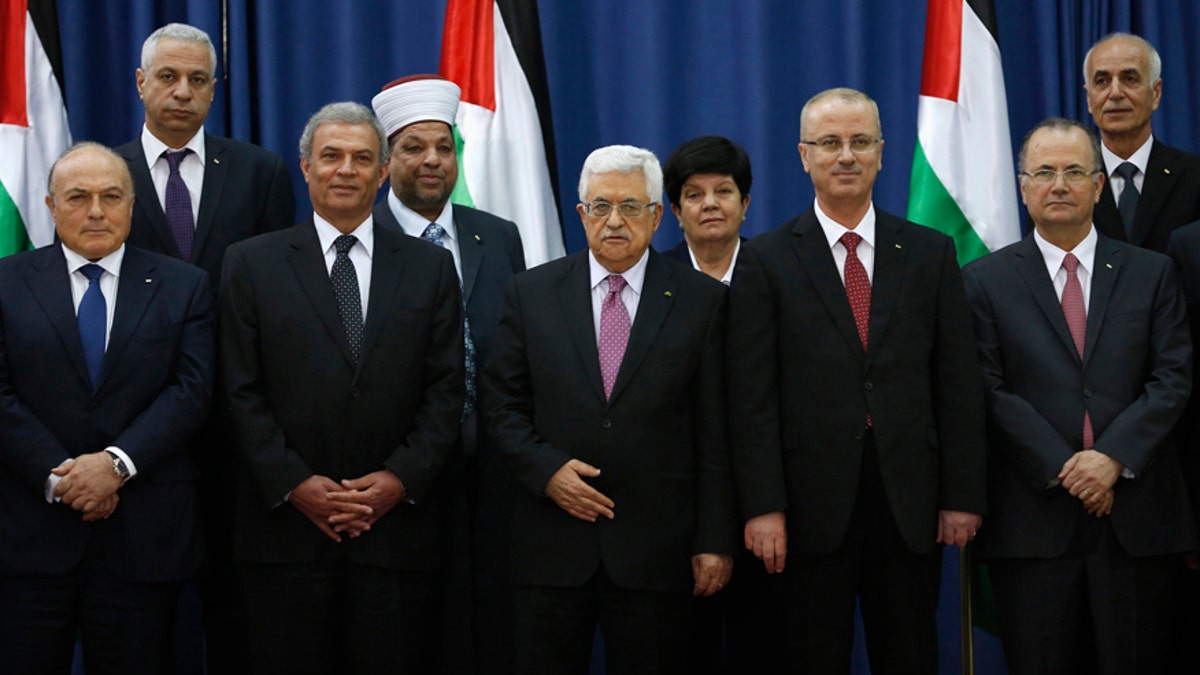
Palestinian Prime Minister Rami Hamdallah (4th L) and Palestinian President Mahmoud Abbas (3rd L) pose for a group photo with Palestinian ministers during a swearing-in ceremony of the unity government, in the West Bank city of Ramallah June 2, 2014. (Reuters)
As a father who raised his three children in Jerusalem, I can tell you that Israelis grow up in an abnormal reality. By law, our homes must be built with a reinforced concrete safe room, our children go to kindergartens and day schools with security guards posted at the door, and our restaurants and cinemas are accessed by walking through metal detectors.
For many years, Israel was one of only a handful of countries struggling to stay one step ahead of violent fundamentalist groups.
Nowadays, it seems that no nation is free from the threat of terrorism. When children are not safe in their schools and families are not safe visiting museums, then it is clear that we have failed to fight back the plague that threatens to overrun entire nations.
[pullquote]
Terrorism does not begin with an attack on a bus or in a café; that is how terrorism ends. Terrorism begins when the seeds of hate are sown in the hearts and minds of ordinary men and women.
This is particularly evident in Palestinian society where the glorification of terrorists is pervasive: children are born in hospitals named after violent extremist groups, attend schools named after terrorists, and play in parks named after murderers.
Earlier this month, the Palestinian Authority named a square in Ramallah after Emad and Adel Awadallah. These two arch-terrorists were responsible for a string of horrific attacks on cafés and buses that left 30 Israelis dead.
Could you imagine the United States government naming a park after Oklahoma City bomber, Timothy McVeigh? Of course not. Yet the Palestinians see no problem in honoring their cold-blooded killers.
Now that the Palestinian Authority has forged a unity agreement with Hamas, an internationally-recognized terrorist organization, the outlook is even grimmer. Textbooks distributed to children in the Gaza Strip deny Israel’s very existence by describing “Palestine” as a state for Muslims stretching from the Jordan River to the Mediterranean Sea.
In March, Hamas’s Education Ministry rejected new textbooks on the grounds that they would foster “negative feelings toward armed resistance” and that the inclusion of topics such as the Universal Declaration of Human Rights would contaminate children’s minds.
Hamas’s idea of a renaissance education is enrolling youngsters in paramilitary camps where they learn to use weapons, assemble explosives, and kidnap Israeli soldiers.
In the shadow of this anti-Israel incitement, is it any wonder that there were 1,500 attacks against Israelis in 2013? The Palestinians may in time return to negotiations, but so long as they continue to teach their children to hate Israelis and Jews, peace will remain elusive.
From the outset, the latest round of peace talks was eclipsed by the Palestinian’s demand that Israel release over one hundred convicted terrorists.
Grieving Israelis watched as Palestinians celebrated murderers like Abu Harbish who threw a firebomb at a bus, killing 26-year-old Rachel Weiss and her three young children. The released terrorists were given a heroes’ welcome. President Abbas warmly embraced the released killers and announced that each one would be rewarded with tens of thousands of dollars.
The Palestinian leadership has yet to learn that real peace requires real commitment. This October will mark twenty years since I watched Israeli Prime Minister Yitzhak Rabin and King Hussein of Jordan shake hands and sign an historic peace treaty between our two countries.
In an emotional speech King Hussein said, “This is peace with dignity. This is peace with commitment. This is our gift to our peoples and the generations to come.”
King Hussein lived by these words. A few years after signing the agreement, tragedy struck. A Jordanian soldier opened fire on a group of Israeli schoolgirls visiting the Jordan Valley, killing seven of the girls and wounding six others.
Horrified by this senseless violence, King Hussein condemned the attack and then visited the homes of the bereaved families. One by one, he sat with the grieving parents, held their hands, offered words of condolence and hugged and kissed them.
King Hussein passed away fifteen years ago, but his legacy of peace lives on. It is time for Palestinian leaders to follow in his footsteps.
We have already lost an entire generation to anti-Israel incitement and there is no end in sight. As the Palestinian leadership proceeds with its unity pact, the international community must be united in calling for the Palestinians to stop condoning death and start sanctifying life.




















